Homecoming
[Here is my annual Halloween-themed short story, to kick off the season. Enjoy!]
Maeve vigorously brushed the besom side to side, its hawthorn twigs making scratching sounds against the hearthstone, causing the old grey cat to flash its yellow slit-eyes in her direction; sensing no threat, it quickly resumed its vigil by the mousehole. Satisfied the last of the ashes were gone, Maeve bowed her head and murmured, “So goes the old year.”
She swept back some chestnut tresses that had fallen across her face and wiped a tear. It had been a long year, and a bad, with much loss. And maybe worse was to come. Tonight would show the way.
She propped the besom in the corner and turned to her young son, who had not yet seen twelve winters, gingerly fingering some small cakes on the table. “Have they cooled?” she asked sharply.
The boy started and jerked his hand away. “Wha?”
“The cakes; have they cooled? That’s why ye were touching them, aye?” Her stern eye fixed upon the boy; her lips pursed, then softened into a wide grin.
It was answered in kind. “Can’t we have just one?”
“No, they’re for the honored, ye know that; ’tis forbidden. After they’ve supped –“
“But that won’t be until midnight! They’re still warm now!” the boy interrupted in exasperation, his freckled cheek flushed and grey eyes sparking. “And last year, Da and Bryan …” his voice trailed off into silence.
“What, Danny?” she inquired, suddenly alert as a chill tingle crawled up her spine. “What about them? What about Da and Bryan?”
“Nothing.” Danny turned away. “Just that they ate all the leavings last year and didn’t let me have any.”
“He’s lying,” his mother thought, shocked at her internal certainty of the fact. “It’s the first he ever lied to me; why now? Why about this?”
Her Ma would know; she knew everything. She could tell a lie across a pasture, just by the stance of the speaker. And what the truth of it was! But her Ma had gone that year as well, along with Maeve’s husband and eldest son. She was Ma now. And all was left was Danny.
She grabbed a wool shawl from the peg by the door; banded in russet and brown, it was the best she had. “Come. ‘Tis dusk and the mist is rising; if we don’t go now we’ll be late.” She reached for the garment hanging on the adjacent peg. “Here – take this,” she said and handed the boy a dark grey cloak, too big for him.
Danny hesitated. “That’s Da’s…”
“’Tis yours now; put it on.”
“But the night is warm, I don’t need it.”
“It’ll help hide ye. There’s worse than the cold abroad tonight.” She turned back to the table and carefully placed nine of the cooled cakes on a wood plate, then set it by the hearth, and pulled two chairs and a stool to ring it. She set three more cakes by the lighted candle on the windowsill. The rest she placed in the carved oaken cupboard that had been her dowry, and her Ma’s.
“Light the punkies,” she said, and Danny tipped two scooped rutabagas to ignite the stubbed candle ends inside them from the taper on the sill. “Ready?”
The boy nodded nervously, following Maeve from the cottage into the gloom. As they neared the edge of the sparse wood, he glanced back at the comforting sight of the candle in the window, and the two large hollowed mangelwurzels dangling from the thatched roof overhang, their carved eyes glowing red with the last of the old year’s embers. A pair of ravens, large and black, clung to the chimney’s edge; outlined in the dusky glimmer, their pitiless dark eyes glittered in the gathering dark. As he watched, they took flight, croaking dolefully, and seemed to follow them as they entered the wood.
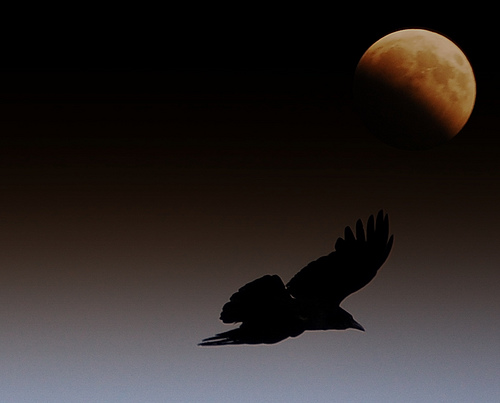
There was a waxing moon on the rise, a few nights before the full; its light was hidden by trees half-shed of their leaves and low-slung clouds which hugged the horizon, then parted into wisps, above which appeared a few early stars. The night was indeed warm for the season, but with a stiff breeze rising, crisp and chill, that caused the thin mists at their feet to swirl and eddy.
The punkies gave just enough light to find the path, assisted by the sound of babbling water on their right, a quick-running stream that brought them water for table and washing. Bracken, fruited canes and small shrubs clustered about its banks; heavy with blackberries in summer and sloe in autumn, now as winter came on they stood rigid and bare. Early that morning Danny had waded into the creek and found them two smoothed, water-tossed mossy stones, palm-sized, for the ritual tonight. Maeve had been pleased he’d remembered; it had been Da’s duty to find them last year, but Da was gone.
The underbrush thickened as the land rose and the trees thinned, and the air of the path felt close and moist. Maeve moved assuredly, face set ahead, but Danny followed behind, eyes glancing side to side, watching for signs. At intervals he saw, or thought he saw, dim flickers deeper in the wood. He tried to ignore them, but they worried him. At the sight of a brighter flare, he grabbed his mother’s shawl and hissed softly into her ear, “Ma! What’s that?”
She whirled to where he pointed. “What?”
“I thought I saw a light…. Is it Jack?”
She peered into the darkness beneath the trees. “I see nothing.”
“’Twas there a moment ago; I’ll swear it.”
“Well, ’tis gone now. A mite early for Jack and his lantern; perhaps another traveler bound as we are, or a will-o-wisp, like as not.” Danny was not comforted by the thought. “They’ll not harm ye, just don’t follow them into the wood. Ye have iron, aye?” Danny nodded, fingering the old rusted nail in his trouser pocket. “Then ye’ll be fine; keep to the path.”
A few minutes more and the trees became sporadic, even the scrub began to thin as the terrain grew steep and rocky. When they emerged onto the lone hillock, bare of all but tufted grass, they saw the clouds had dispersed and a lopsided yellow moon rode its crest. Shining dully through a haze, it gave enough light to silhouette a tall pile of tree limbs and brush, mounded at the very top of the hillock for a bonfire. From all sides streamed lines of shadowed figures, each holding aloft a dimly glowing punkie as they ascended the hill.
As they drew closer, Danny saw that many were strangely garbed, fantastically masked as beasts, fiends or fay. Waiting for them at the hilltop was a tall, erect figure robed in white, seeming to shimmer in the moonglow. His back was to them, arms uplifted as if in entreaty to the celestial orb. The throng edged close about him, stragglers continuing to arrive for several minutes as the rest waited quietly or murmured to those nearest in hushed tones. The air was electric with expectancy, humming as a hive of bees.
As the last of the people gained the summit, maybe four score clustered about the celebrant. At length he turned to greet them. Aged but unbent, his scalp balding but his beard long and white, he seemed the personification of hoary wisdom. “Are all here?” Heads turned to their neighbors, validating their numbers, and a soft chorus of whispered “ayes” replied to his query. “Then well met!” he cried, and flung his arms wide in a gesture of inclusion.
“Well met!” the congregation thundered, and held the punkies high.
“’Tis the night of all nights – summer’s end! The turn of the year, the time between time. We who stand here are not all who gather at this place – remember the departed, and honor them, for they are nigh! Past and future are one, the veil is rent, and gone is the boundary between worlds.”
He stooped to retrieve a lighted punkie at his feet. As he held it high, the congregation mirrored his action. “The old year passes!” He exclaimed, and blew hard on the feeble flame within the punkie, extinguishing it. Those ranged about him did likewise, until the only glow on the hillock was that of the moon. “The old year fades, the new year beckons, but for this one night, we stand between them, and all of past and future shall be revealed.”
His voice gained in power and force as he continued. “Have ye lost a dear one?” A moaning response of “ayes” swept the congregation, and Maeve took her boy’s hand; she could just discern his upturned face in the glimmer, cautious, awed. “They are returned!” The congregation shouted joyously.
“Do ye fear aught? Do ye fear loss?” Maeve nodded unconsciously, and pulled her boy close to her. “Speak, and be comforted.” A cacophony of voices ensued, with each simultaneously calling out their worst fears for the coming year. The celebrant nodded in sympathy as the cries echoed to the trees below.
“Now see, we are all brothers and sisters together; we have the same roots, the same blood, the same fears and hopes. Even as we extinguish the old year, we kindle the new!” So saying he strode to a central part of the stacked timber, and bending to the ground he lifted up three bits of wood, two blocks and a pointed shaft, lying aside a small pile of straw and a curved bow strung with twine.
He presented the first block to the assemblage; it had a small notch at its center. “Brother Oak, whose time is passing.”
“Brother Oak!” they cried. Retaining this in his left hand, the celebrant then raised the second block of wood, also notched. “Sister Holly, whose time is nigh.”
“Sister Holly!” came the reply. He placed this back on the ground before him, and surrounded it with straw. Now he presented the pointed shaft: “Father Ash, who bridges and binds the worlds.”
“Father Ash!” roared the crowd. He placed the blunt end of the shaft in the notch of the oaken block, then picked up the bow. “Mother Hazel, who brings the magic of the Needfire!”
“Mother Hazel!” came the echo.
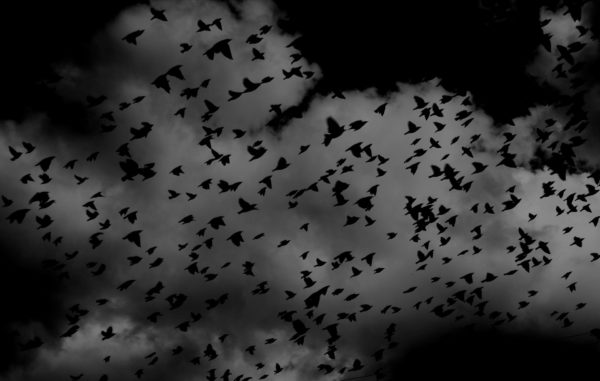
He wrapped the bowstring tautly three times about the middle of the shaft, then, bending, inserted its pointed end in the notch of the holly block amidst the straw, holding it erect with the block of oak to steady it . Kneeling before this contrivance, he began to chant, words indistinct or incomprehensible to those foregathered, as he drew the bow briskly back and forth, causing the shaft to rapidly rotate in its notches.
He applied himself to this task for some minutes, chanting ceaselessly, as a hushed silence reigned. Then! A spark, and another, and a third! A glimmer, then a glow, as the flashes caught in the straw, and the blaze of the new year was kindled.
The celebrant stood and bowed as the congregation erupted into shouts of joy and peals of relieved laughter, each turning to embrace his neighbor. Two officiants came with tarred branches to light from the straw, and handed them to the celebrant, who in turn thrust them into the bonfire, which burst into flame.
“Behold! The new year dawns, but ere we see that dawn, we shall know what it brings. Come now singly; let us peer into time, through the veil that no longer obscures the future, or hides the past.”
Men and women who sought guidance from the seer began to separate by gender, then formed lines which spiraled back onto themselves into whorls, men to the celebrant’s right and women to his left. The children in the group began to drift back to form a cluster between the two, attended by the few adults who did not wish to know the future.
Danny turned to join them, but was clawed back by his mother, who thrust him into the men’s line. “But –“ he began.
“You’re head of the house now; it’s your right to be there,” she whispered, flashing him a reassuring smile and a firm nod, then left to join the women.
The celebrant had placed an intricately carved stone bowl, covered in a white cloth, on top of a metal tripod set before the bonfire, to warm its contents. Faint tendrils of smoke emerged from beneath the cloth, and the celebrant now pulled it up, then bent to the bowl and covered his head with the fabric for a few moments before turning his attention back to the assembly.
Standing between the two lines, he beckoned first one gender, then the other, and at his gesture the lead person in each line came before him. A murmured conversation ensued, punctuated with more trips to the smoking bowl, until the celebrant dismissed the querent and called for the next. Before departing, each querent tossed a stone into the bonfire, like the ones Danny had chosen for himself and his mother that morning.
Danny’s place in line had been superseded by older, more aggressive males, until he found himself at its rear. Although the women’s line was longer, his mother had her turn before the fire long before Danny had his, and went to wait for him with the children. He saw that she came away from the celebrant looking troubled and ill at ease, throwing him a concerned glance as she passed.
The boy licked his lips nervously as his turn before the celebrant came nearer. He had never interacted with the old man before, to Danny he was just a symbol of authority, remote and unapproachable. As he stood waiting, the heat from the bonfire flushed his face, warming his cheeks uncomfortably and sending small rivulets of perspiration down his back.
At last the celebrant dismissed the maid before him, and motioned to Danny to approach. His face was kind, softly smiling, but his milky blue eyes were wide and dilated, watery and red-rimmed from the smoking bowl.
“And who have we here?” he asked, cocking his head quizzically. “We’ve not yet had speech together.” Danny spoke his name and clan, and the old man nodded. “Son of Niall that was? Your father was a good man, and his loss was heavy. Have ye followed in his ways?”
“I hope that I have,” the boy replied tentatively.
“A wise course, young Daniel; ye can do no better than to heed his example.” He paused, and with his left hand placed the tip of a forefinger on the boy’s temple. Danny averted his gaze, and the old man brought his other hand to the boy’s chin, raising his face to peer directly into his eyes. “There is aught here,” he murmured, “which needs revealing.”
Suddenly he broke contact and turned to the smoking bowl, plunging his head beneath the cloth for a full five breaths. When he returned his attention to the boy, Danny was shocked by the change in him; grim-faced and stern, with eyes darting wildly, he grasped the boy by both shoulders and pulled him close, drawing him onto tiptoe. “There is pain here, and fear; and … guilt. Thy father … and brother … last year … what is it? Tell me now!”
“I – I – don’t know what ye mean,” stammered Danny.
“Don’t lie to me! Ye know something; something vital. Tell it me!”
Danny swallowed hard before he spoke. “Last year, before the festival …”
“Aye?”
“Da and Bryan; they were foolin’, by the hearth. Ma was out in the yard… Bry said he was hungry, and the cakes were still cooling…”
“Now we come to it,” said the celebrant, and his eyes flashed.
“They ate some. Da said it was no sin, to feed a hungry soul. Better the dead should starve than they. And they laughed…”
“Blasphemy!” The old man released his grip, and as he sagged back onto his weight, Danny felt like his knees would not support him, staggering a pace to one side. “I’d not have thought it of thy father. And to damn his own son as well!”
“Damn…?” whispered Danny, with shock in his voice.
“Aye; ‘tis forbidden, what they’ve done – ‘tis sacrilege, to eat the food of the dead! Know ye not that?”
“But… they just…”
“No pardon! They knew the rule, and disregarded it! They are Sluagh now, shades of the dead who have sinned and know no rest – ever hungry, ever thirsting, never at peace!”
The boy cowered before him. “No! This cannot be! Is there naught can be done for them?”
The old man paused, and the light fell from his eyes as he turned his face downward and to the side. “Mayhap… mayhap.” His voice was rasping as he continued. “When I was young as you, I knew a crone, wise in years, whose son had done the same, and partaken of the dead’s due. Cursed and damned, doomed to wander for all time, her heart bled for him – for all his sin, he was still her son. And so she searched, and questioned, and sought the sagest among her, until at last she found a way. Not to redeem him, for that is past! But to release him from his torment.” He paused again, and his knot-knuckled fingers threaded through his beard to scratch the chin beneath. “It is a perilous path, which must be trod alone, and the sacrifice is great! But you … are but a lad.”
Danny’s heart quailed within him, but a pit of resolve began to form in his will. If there was a way to release his Da and Bry, he must do it! “Tell me. I cannot leave them damned.”
The celebrant slowly raised his head; his eyes met Danny’s. “Ye must tell none of what I tell ye now, not even your mother. Swear!”
“I swear it.”
“Then bend your head to mine, and listen carefully…”
* * *
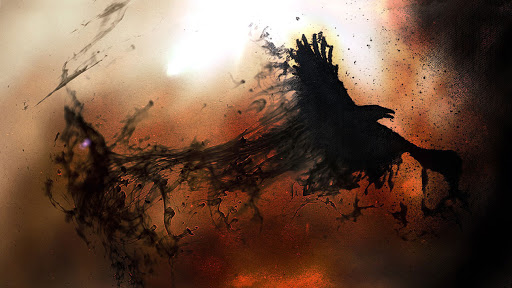
As the pair retraced their steps toward home, the moon rode high above them, casting a silvery light that bathed their path in milky tones, near bright as day. Danny took the lead, carrying in his punkie an ember from the bonfire with which to kindle their first cottage fire for the new year. Its feeble light glowed but dimly, lost in the brightness of the moon’s rays.
Maeve’s mind was cluttered with thoughts too complex to integrate, but too pressing to ignore. She relived the scenes of the past few hours, the extinguishing of the old year and the kindling of the new; the igniting of the bonfire; the spiral dance that followed the consultations with the officiant; and the ritual tossing into the fire of the stones that symbolized themselves and their old lives, consumed in the blaze of the future, reborn from the ashes of the past. In the morning they would return to retrieve them, and look for a further sign of what the twelvemonth ahead would hold.
She thought hard upon all these things as she followed her boy into the wood, and she replayed her interview with the sage. “I see that ye be heartsick still at the loss ye have endured this year. Your good man and your eldest, this was a grievous hurt, not easily overcome. And your dame, a loss that cannot be replaced. But take heart – ye have another son, hale and hearty, like to live and grow to manhood. Take care that ye do not let your sorrow overmaster ye, for that way leads to hopelessness, and danger.”
Maeve pondered this while she walked behind her boy as in a trance, unseeing, but mostly she thought of the officiant’s final words to her, incomprehensible though they seemed. For as she threw her stone into the fire, the sage had pulled her aside again and whispered into her ear, “Trust the lad; do as he bids. There is wild work to be done tonight, if ye and yours are to be saved. Follow his lead.”
What could it mean? With a start, Maeve realized she was already unconsciously following the old man’s advice, in allowing her boy to lead her home. She noticed Danny had been swiveling his head side to side, not with the fear and foreboding he had shown on their journey out, but as a dog does, questing. Just then he stopped all of a sudden, freezing in his tracks, causing Maeve almost to collide with him.
“Ma, this flower, do ye know it?” he asked, pointing to a small pale purple-blossomed bush by the path’s edge, shimmering in the moonlight.
“Aye, ‘tis the herb sea lavender, what some call Lethe’s bramble.”
“So? Then ‘tis what I seek.” Stooping, he plucked three stems from the plant.
“What you seek? What means this?” she probed, confused.
Danny turned sad eyes upon her. “Ask me no questions, mother. I am about my master’s work.”
The solemnity and sorrow in his voice stilled Maeve’s tongue, so that she made no comment when he stopped again, further down the path, uprooting a sprig of rue, then once more, pulling a few last withered leaves from an elder tree that stood beside the clearing of their cottage. She wondered, and she feared, but the old man’s final words kept ringing in her head: “Trust the lad … Do as he bids … Follow his lead…” And so she walked behind, and said nothing, as her boy gathered herbs of magic, and of power.
As they entered the clearing, two large ravens flew in from the west, circled above them a moment, and came to roost upon the chimney. One cawed mournfully, and a chill went through her. The sound was almost human in its tone, beckoning, entreating, and mournful, all at once. Danny seemed to purposefully avert his eyes from the rooftop, and strode resolutely to the threshold. Here he paused, and placed the punkie on the outer sill of the window.
“Mother, have ye no business with the night, before we go inside?” Perplexed, she answered, “None.”
“Are ye certain?” Their eyes met, and his burned steadily in the glow of the lighted mangelwurzels. She faltered. “…perhaps I have…”
He nodded. “There is no need of haste. I have somewhat to do.” The chill within Maeve grew as she turned away from the door, then swiftly back to him again. “But…“ she began, and he interrupted her. “Ask me no questions, mother. I am about my master’s work,” and he motioned her away.
“We may have need of water before the night is done,” he called after her, and she bent to retrieve a clay jug from the porch, stumbling toward the creek as one in a dream.
When she had gone from his sight, Danny moved to the rear of the cottage, where the fireplace foundation bulged away from the cottage wall. Scrabbling at its base, he came away with two smooth, flat stones, water-washed and fire-blackened, which had lain there for a year. He raised his eyes at last to the pair of ravens on the roof, then spat upon the stones, and between them he crushed the elder and the rue, until they formed a sticky mass. Then he fished in his trouser pocket for the old rusted nail, and smeared it with the mixture, afterward carefully replacing it and the stones in his pocket.
Returning to the porch with his makings, he rehearsed the old man’s instructions in his mind. ‘They will come tonight, at midnight. Be prepared! They are not what they were! Gather ye elder leaf, for the dead, and sprig of rue, to protect thyself and thine. Bind these with spittle in the rubbing together of their tokens, and add to it iron, which renders powerless the world of Fay.’
‘And the third, the bramble?’ he had asked. ‘Take the flowers of one stem before ye enter, and chew them, slowly, calling on the Morrigan for aid. It will help ye see them as they are, and thy gran, and enlist her succor. The other stems are for after, should ye see the dawn, for thyself and thy mother, so ye may forget this night and the terror thereof.’
Before entering, Danny whispered a prayer of protection and aid to the Morrigan as he chewed the bramble flowers, and retrieved the punkie from the sill. He gathered together a log and a few smaller branches from the kindling kept upon the porch, setting them by the threshold. Not certain what he would find, he opened the door slowly, and crossed the threshold with the punkie and his magical burden.
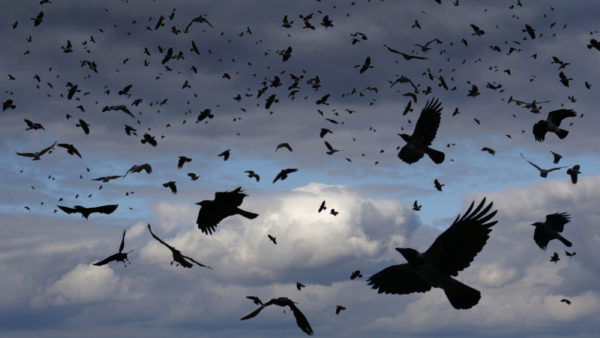
The room was dark; the candle they had left in the window burned low, emitting little light, but as his eyes adjusted to the gloom after the bright, moonlit clearing outside, he saw the room was empty, the chairs and stool unoccupied by the hearth, the cakes untouched on the plate. All was as they had left it. ‘Not yet midnight,’ he thought, and breathed another prayer that his mother would tarry by the creek.
He brought in the kindling from the porch, threaded his way past the chairs, and placed the wood in the fireplace’s enclosure, then took a handful of straw from a basket at the hearthside, arranged it on the wood, and upended the ember from the punkie onto it. The straw caught quickly, and within moments the fire had leapt to the wood. Before long it was blazing brightly. Yet despite the fire’s warmth, he felt a chill, and a frisson passed through him. Even before he turned from the blaze, he knew what he would see.
The chairs and stool were unoccupied no longer. Three white, wispy shapes hovered there, seated yet suspended, insubstantial as mist, moving into clear focus and then blurring out again. His gran he saw plainly, but his father and brother were distorted and warped, like a smudged charcoal sketch.
“Well met,” he murmured, and his gran’s crystal blue eyes smiled at him. ‘Well met, child,’ she replied, but in words only to be heard within his head. His father and brother nodded only, then turned their heads slowly to each other, and in the instant, Danny saw them for what they were in truth – bony, peaked heads with stringy, sparse hair and beaked, hooked mouths, full of gnarled teeth. Haggard and creased, their limbs were skeletally thin, skin clinging limply, tipped with bony, fleshless claws, with great leathern wings drawn tightly against them, like a swaddling cloak. Sluagh!
Danny fought the urge to cry out, to run, not daring even to betray his shock and dismay. “Well met, father,” he repeated, forcing a smile, and in this naming his father’s face reappeared from the Sluagh form, shifting in and out of both realities randomly. His father’s lips opened to speak the word “son,” but Danny heard only the raven’s caw.
His grandmother heard it, too, and seemed for the first time to notice her companions. She peered at them, aghast, and made as if to caution Danny, but he caught her glance and warned her off with an imperceptible sideways motion of his head. She nodded comprehension, and settled back into her hovering seat, wary, watchful.
“Well met, brother,” Danny addressed his sibling, but the Sluagh that had taken his form merely turned its glittering, black raven’s eyes toward him. “Ye must all be hungry,” the boy continued, and proffered the plate of cakes to the trio.
The Sluagh pair kept their eyes steadily upon him, immobile and unfeeling, but his gran reached for a cake, took it in her spectral hand, and downed it in one bite.
“Where is thy mother?” asked the creature that had been Danny’s father, at last finding speech, but his voice was like the slide of stones into a pit. “’Tis for her we have come,” his form continued to oscillate between Sluagh and man, as he added, “to ease her pain.”
Danny’s thoughts flashed to the old man’s warnings. ‘They come, not for the ritual sustenance ye offer, but for thy mother’s soul. Heartsick from their loss, she is prey to them now, burdened as she is with grief and woe. They will take her if they can.’
“She is on an errand to a friend who is sick, and will return soon. Pray tarry for but a little while, rest and refresh yourselves, she will shortly be with us.” And again he offered the cakes with a gesture. “Take, eat…are they not your favorites?”
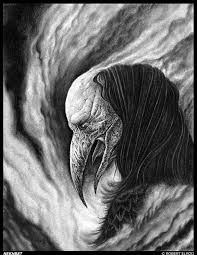
As one, the Sluagh extended their clawed hands to the plate, each grasping a cake and passing it slowly into their beaked mouths. That first taste seemed to activate a hunger that gnawed them, and they quickly reached for more, rising from their seats and leaning down into the plate upon the hearth, feeding greedily, distracted and unwary.
Again the celebrant’s words echoed in Danny’s mind. ‘When they feed, ravenous and straining forward for nourishment, they are vulnerable. Take then their tokens, smeared with the paste ye have made, and place them on their seats, that their forms be bound to the hearthside.’
“Ye have a great hunger. There are more, for your contentment,” suggested Danny; moving to skirt the Sluagh, he retrieved the herb-smeared stones from his pocket, resting them upon the seats they had vacated as the Sluagh remained absorbed in their repast, but retaining some of the mixture on his fingertips. As he passed the spirit of his gran, he looked deeply into her eyes, hoping to reach her in thought: ‘Ma; the creek.’
Her blue eyes glimmered as she caught his meaning, and in a moment she had dissolved into a swirl of mist, billowing into the hearth, up and out the chimney on her errand.
Danny paced to the cupboard and removed the remaining cakes his mother had baked that afternoon. He carefully smeared some of the herbal mixture from his fingertips onto the undersides of several cakes before returning with them to the hearth. The old man’s instructions reverberated in his head: ‘Their tokens do but bind them to the place; to control them, they must eat unknowing of the paste; only then can ye perform what must be done.’ Smiling, he placed the plate of fresh cakes on the hearth, between the pair of insatiable Sluagh. He suppressed an involuntary shudder as their leathern wings brushed him in their haste to ingest the cakes. “Here; enjoy your feast.”
* * *
Maeve filled the jug with the cold, clear water, then slumped to her knees at the creekside. Thoughts buzzed in her head like a swarm of bees, but clouded and indistinct. What could all this mean? What ‘work’ was her boy engaged in, and for what ‘master’? What was her role in this – a passive observer and pliant support, as the officiant had instructed, or a parent whose duty was to protect her child?
She felt strangely lethargic, rooted to the spot, unable to initiate any action. She didn’t know how long she sat thus, until she saw a strange pale smoke, or mist, wafting toward her, against the breeze. At first the sight filled her with dread, but as it approached, she felt a peace, and then the comfort of her mother’s love, as the mist resolved itself into the likeness of her departed parent.
‘My child,’ the apparition said without speaking. ‘Thy child has need of thee. Come with me now, and do not fear.’ Leaving the jug of water by her side, Maeve rose and swiftly followed her mother’s retreating specter.
***
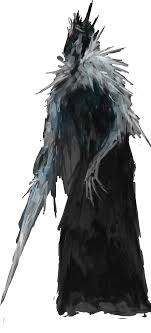
In the cottage Danny watched with veiled anticipation as the Sluagh wolfed the cakes. Those he had smeared with the paste were concealed in the midst of the pile, and he was uncertain they had been eaten until the plate was emptied. Even then, the Sluagh had supped so voraciously, he could not be sure both had taken some of the charmed cakes. When the pile had been reduced to crumbs, the Sluagh turned their hungry black eyes upon Danny, regarding him with appetite.
“Ye have dined well; were the cakes as good as last year?” Danny asked, taking care to back off the hearthside, and fingering the rusted, paste-smeared nail in his trouser pocket. Still famished, they lunged at the boy, seeking more nourishment, but were arrested by the power of his charm. Frustrated and confused, fury showing in their beaked faces, they screeched and cackled as they impotently stretched bony claw-tipped arms toward him.
“Sluagh, I see thee now! No more my dear ones, thy crimes and blasphemy have cursed and damned ye and made ye thus!” The pair shrieked and raged, battering themselves against the magic walls of their invisible cage. But the charm held, and they could not cross the hearthstones. “And yet I pity thee, and offer release.” Danny extracted the nail from his pocket and held it aloft; its iron seemed to glow as from the forger’s fire.
Trapped and desperate, they increased their baleful cries and frantic struggling, vainly trying to escape. As they turned toward the blaze on the hearth, seeking egress through the chimney, the form of Danny’s gram appeared before them, blocking its access. Then Maeve thrust open the cottage door.
Despite her mother’s calming presence as she led her home, apprehension and foreboding had grown within Maeve while she retraced her steps to the cottage. If her boy needed her, she would be there, but she felt the gnaw of anxiety and fright in the pit of her stomach as she neared the threshold. When she gained the porch, her mother’s apparition flew up and over her head to the rooftop, while Maeve paused at the doorway; something held her back, until she heard such horrid screams and screeching from within that she set aside all thought of safety and burst through the door.
The scene before her was one of utter pandemonium. Danny stood back to her, his arm raised high, speaking words of power as two dim shapes leapt and swayed beside the hearth, lunging back and forth, bounding high and crashing down again, as if held by invisible restraints. Backlit, but with the fire glowing through them, she did not recognize them at first, then saw the loved visages of her husband and elder son. A moment of joy coursed through her when she saw her dear ones returned, until she realized this was a scene of conflict.
As she focused on them, they seemed to alter before her very eyes, transforming into some hideous parody of what they had been in life: haggard, drawn, impossibly thin and skeletal. Danny was yelling in a commanding voice like none she had heard from him before, but the language was strange and unfamiliar to her. At each syllable, her husband and son appeared stricken, stabbed with pain, and in that anguish they looked themselves again, and Maeve’s soul-sick heart went out to them. Her tortured gasp alerted them to her presence, and their eyes leapt to her, entreating her aid in ending their suffering.
“Danny! Stop this! What are ye doing? They are hurt!” She rushed to them, roughly pushing Danny aside in her haste to be reunited with her lost loved ones. Her boy crashed into the stool and came down hard; the nail clattered to the floor in a far corner.
The moment she crossed the hearth she knew she had made a fatal error. The shades before her fully revealed themselves in their monstrous guise, no longer the dear ones she had mourned for months, but hideous counterfeits of their former selves. She saw her mother’s shade reaching out to pull her back, but the Sluagh swirled about her closely, preventing her rescue. As they bent to enclose her in their winged arms, their beaked mouths opened to exult in her capture with raucous cries.
Danny watched with horror as the Sluagh enveloped his mother; finding his hand empty, he scrambled across the floor on all fours, seeking to recover the iron nail, his only hope of saving her. At last he felt the bite of it under his outstretched palm as his questing hand collided with his quarry, driving its tip into his flesh.
At the scent of fresh blood, the Sluagh broke off their assault on Maeve, their attention riveted on Danny as he rose and approached them. “Sluagh!” he addressed them. “Is it this that ye seek?” he asked, holding his bloodied palm high up. The damned creatures craned their heads side to side, looking from mother to son, as if deliberating between them. “Her blood for mine,” bargained the boy. “Release her, and ye shall have it!”
With a roar as of a rushing wind, the Sluagh ejected Maeve from their midst; tossed from the hearthstones, she crumpled to the floor as her mother’s apparition flew to her side. Without hesitation, Danny flung himself at the Sluagh which had been his father, wrestling it onto the hearth, while its wings flapped and flailed, struggling impotently against the wielder of the force that had contained it.
The Sluagh who had been Danny’s brother attempted to intervene, but the spirit of its gran, satisfied that her daughter was unhurt, returned to the fray with fervor, ferociously beating back her former grandson into a far corner of the fireplace, and trapping it there.
Danny had the Sluagh down upon its back now, winged arms pinned to the hearthstone, wriggling helplessly, beaked head twisting back and forth in its desperation. “Peace, Sluagh!” commanded the boy, and its struggles ceased, until it lay immobile, regarding its captor with a baleful glare. Danny brought his right hand upward, clenching the bloodied, paste-smeared nail in his fist. “For the love I bore thee!” he cried as he plunged the nail down and into the eye of the Sluagh.
The creature gave a last hideous screech, writhed violently, then dissolved into a shimmering grey mist which slowly dissipated into the air. “Be at rest, father,” he murmured, then turned his attention to the Sluagh cowering in the chimney.
“Brother, attend.” The Sluagh, freed by its gran, came creeping to his side. “I release thee also,” said Danny, as the creature groveled before him, then did as he had done for his father. When the echo of its dying shriek had faded from hearing, Danny slumped onto the floor, exhausted.
Maeve came to him then, and held him in her arms while he softly wept. There was much she did not understand, but that could wait. The apparition of her mother enfolded them both, and remained in that embrace until the pale light of dawn sent her to her rest.
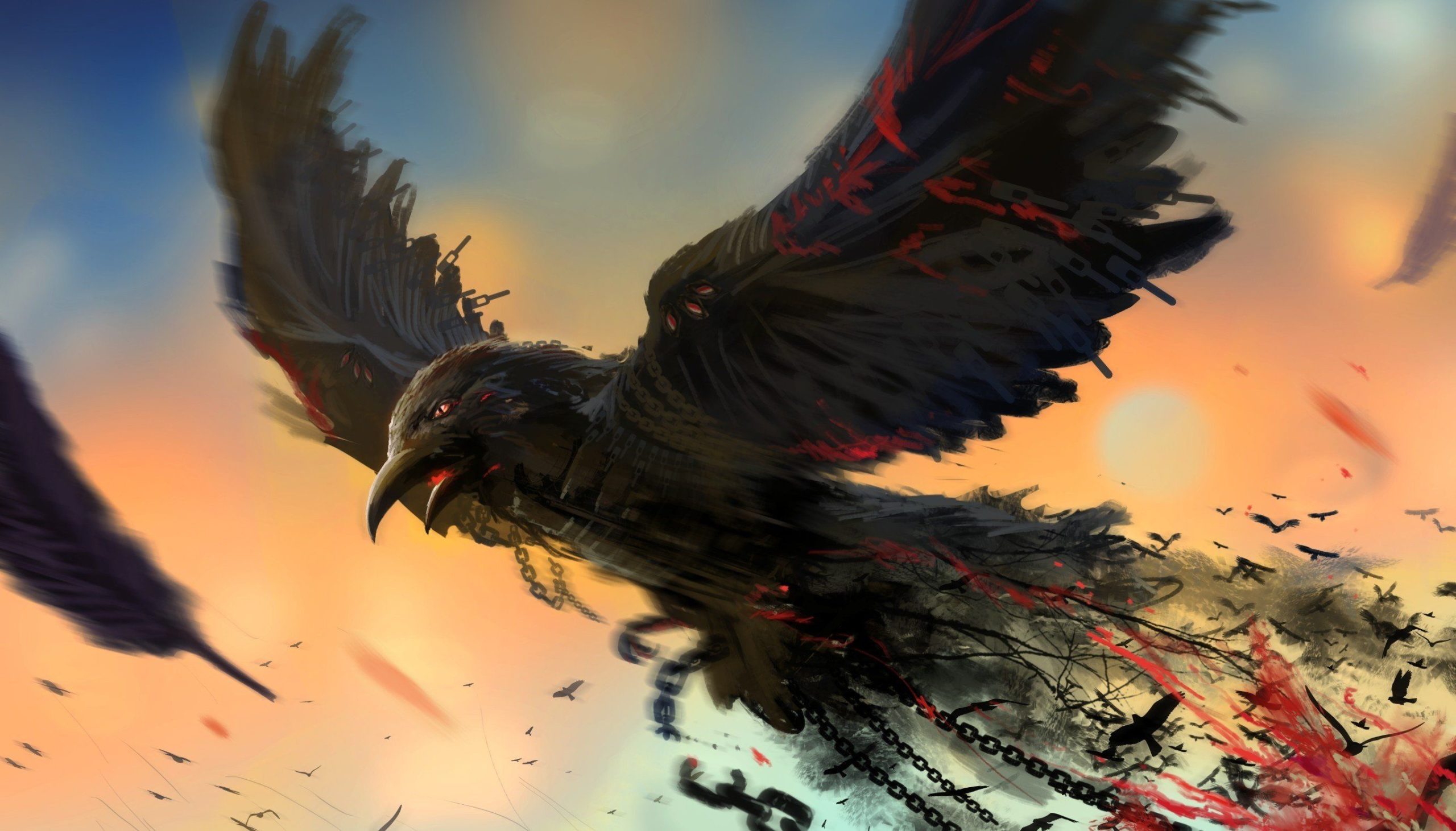

3 comments, add yours.
Laurien
Well done, Alex! This story will put anyone in the mood for Halloween! You’re obviously a natural storyteller, and I’m glad you find time for fiction in between your work with asteroid astrology and all the other interesting things you do!
Gail
Exceptional and enchanting story.
char555
Marvellous, Alex! Thank you so much